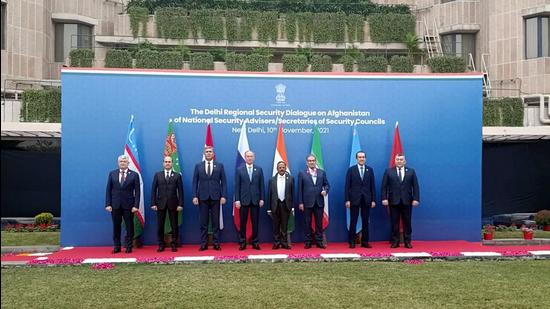Delhi dialogue on Afghanistan calls for open and inclusive govt in Kabul
Eight countries pitched for cooperation to tackle radicalisation, extremism, separatism and drug trafficking, according to a declaration issued at the Delhi Regional Security Dialogue on Afghanistan
Top security officials of eight countries, including India, Iran and Russia, on Wednesday said Afghanistan’s soil shouldn’t be used for planning terrorist acts, and called for an open and inclusive government in Kabul with representation from all sections of Afghan society.

The officials also pitched for collective cooperation to tackle radicalisation, extremism, separatism and drug trafficking in the region, according to the declaration issued at the conclusion of the Delhi Regional Security Dialogue on Afghanistan.
The meeting, chaired by India’s National Security Adviser (NSA) Ajit Doval, was attended by Iran’s supreme national security council secretary, Rear Admiral Ali Shamkhani, Russia’s security council secretary Nikolai Patrushev, and the security council heads of Kazakhstan, Kyrgyzstan, Tajikistan, Turkmenistan and Uzbekistan.
Though this was the first such meeting on Afghanistan convened by India, the dialogue was the continuation of a mechanism whereby Iran hosted two meets in 2018 and 2019. Pakistan and China were invited to the meeting but opted not to participate.
In his opening remarks, Doval said the time had come for closer consultations and greater coordination among regional countries to find solutions to recent developments in Afghanistan.
Also Read: PM Modi speaks to security heads of 7 nations as Delhi calls meet on Afghanistan
“We all have been keenly watching the developments in [Afghanistan]. These have important implications not only for the people of Afghanistan, but also for its neighbours and the region,” Doval said in televised remarks.
“This is a time for close consultations among us, greater cooperation, interaction and coordination among the regional countries,” he said.
Shamkhani referred to the challenges of terrorism and a refugee crisis, and said, “The solution comes only through the formation of an inclusive government with the participation of all ethnic groups.”
The Delhi Declaration on Afghanistan, issued at the conclusion of the dialogue, said that “Afghanistan’s territory should not be used for sheltering, training, planning or financing any terrorist acts”.
It stressed on the need to form “an open and truly inclusive government that represents the will of all the people of Afghanistan and has representation from all sections of their society, including major ethno-political forces in the country”.
The declaration contended that the inclusion of all sections of Afghan society in the “administrative and political structure is imperative for the successful national reconciliation process” in Afghanistan.
The declaration strongly condemned all terrorist activities and reaffirmed the commitment of the eight countries to combat all forms terrorism, including its financing, to dismantle terrorist infrastructure and to counter radicalisation in order to ensure Afghanistan “would never become a safe haven for global terrorism”.
The eight countries said they supported a peaceful, secure and stable Afghanistan while emphasising “respect for sovereignty, unity and territorial integrity and non-interference in its internal affairs”.
They also expressed concern at the suffering of the Afghan people because of the security situation and condemned terror attacks in Kunduz, Kandahar and Kabul.
Also Read: Pakistan to host ‘Troika summit’ to discuss Afghanistan situation
The declaration further emphasised the importance of ensuring that fundamental rights of women, children and minorities are not violated, and expressed concern at the deteriorating socioeconomic and humanitarian situation in Afghanistan.
In this context, the declaration pointed to the need to provide urgent humanitarian aid to the Afghan people.
While pointing to the UN’s “central role” in Afghanistan, the eight countries said humanitarian assistance should be provided in an “unimpeded, direct and assured manner to Afghanistan” and this aid should be distributed in a non-discriminatory manner across all sections of Afghan society.
The NSAs and security council secretaries of all eight countries, in their brief opening statements, pushed for collective efforts to cope with threats such as terrorism and drug trafficking emanating from Afghanistan and to provide humanitarian aid to the Afghan people before the onset of winter.
Patrushev noted the proliferation of dialogue mechanisms on Afghanistan, including the Moscow Format and Turkic Council, and said it was important that these forums do not duplicate work but complement each other.
Kazakhstan’s national security committee chairman Karim Massimov said his country is closely monitoring threats from Afghanistan. “With the Taliban movement coming to power, the situation inside the country remains complicated. There are many obstacles to form an effective government system,” he said.
“Terrorist organisations are intensifying their activities. We are strongly concerned with the operations of the Central Asian fighters,” he said.
Tajikistan’s security council secretary Nasrullo Rahmatjon Mahmudzoda said his country is concerned about developments following the Taliban takeover because it has a long border with Afghanistan.
“The current situation creates extra risk and possibility for growth of drug trafficking, terrorism and criminality. The situation on the Tajik-Afghan border remains complicated currently under the influence of many negative factors,” he said.
Get Current Updates on India News, Lok Sabha Election 2024 live, Infosys Q4 Results Live, Elections 2024, Election 2024 Date along with Latest News and Top Headlines from India and around the world.




